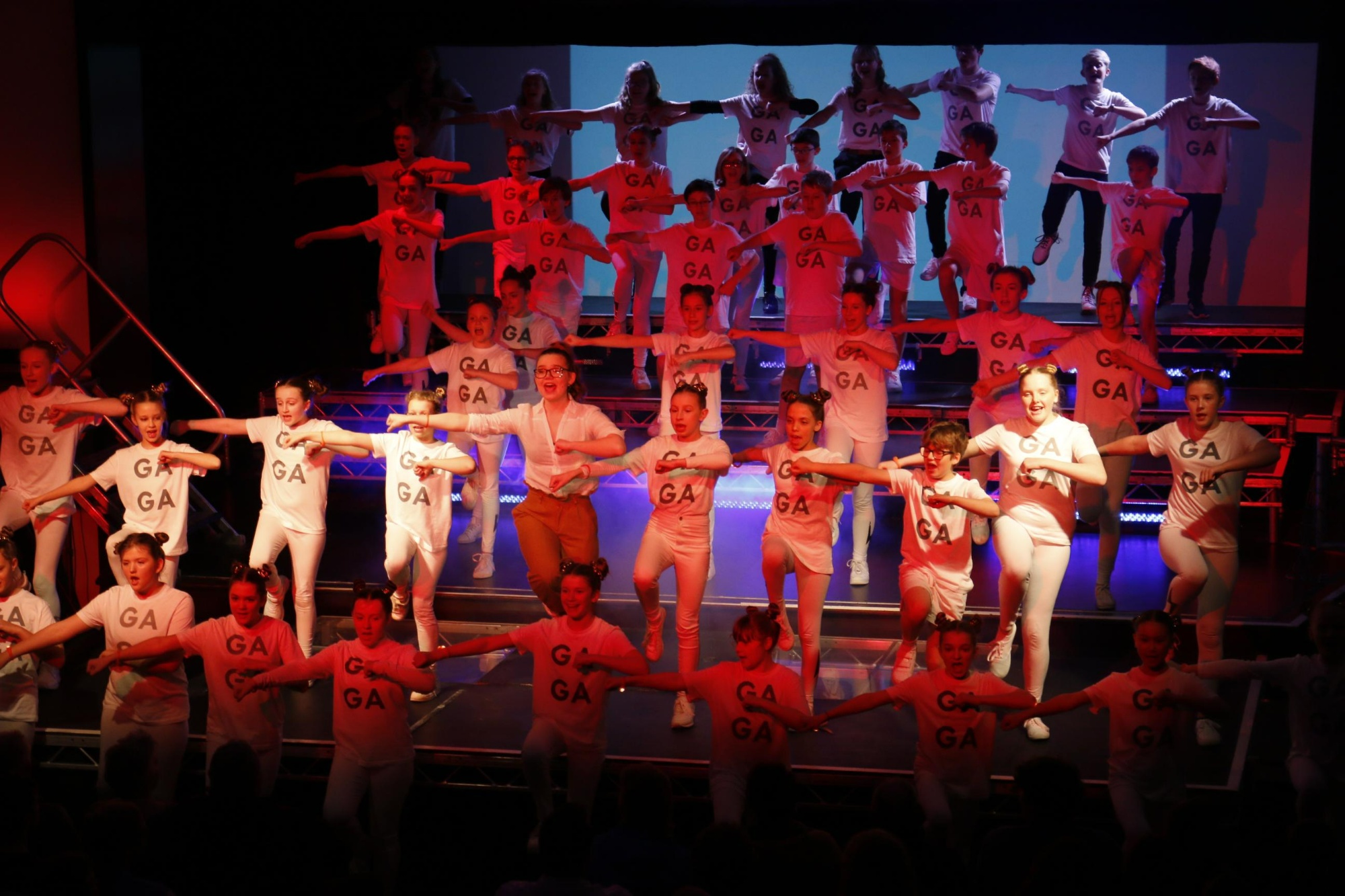Drama
Welcome to Drama
Drama is a popular, highly respected subject at 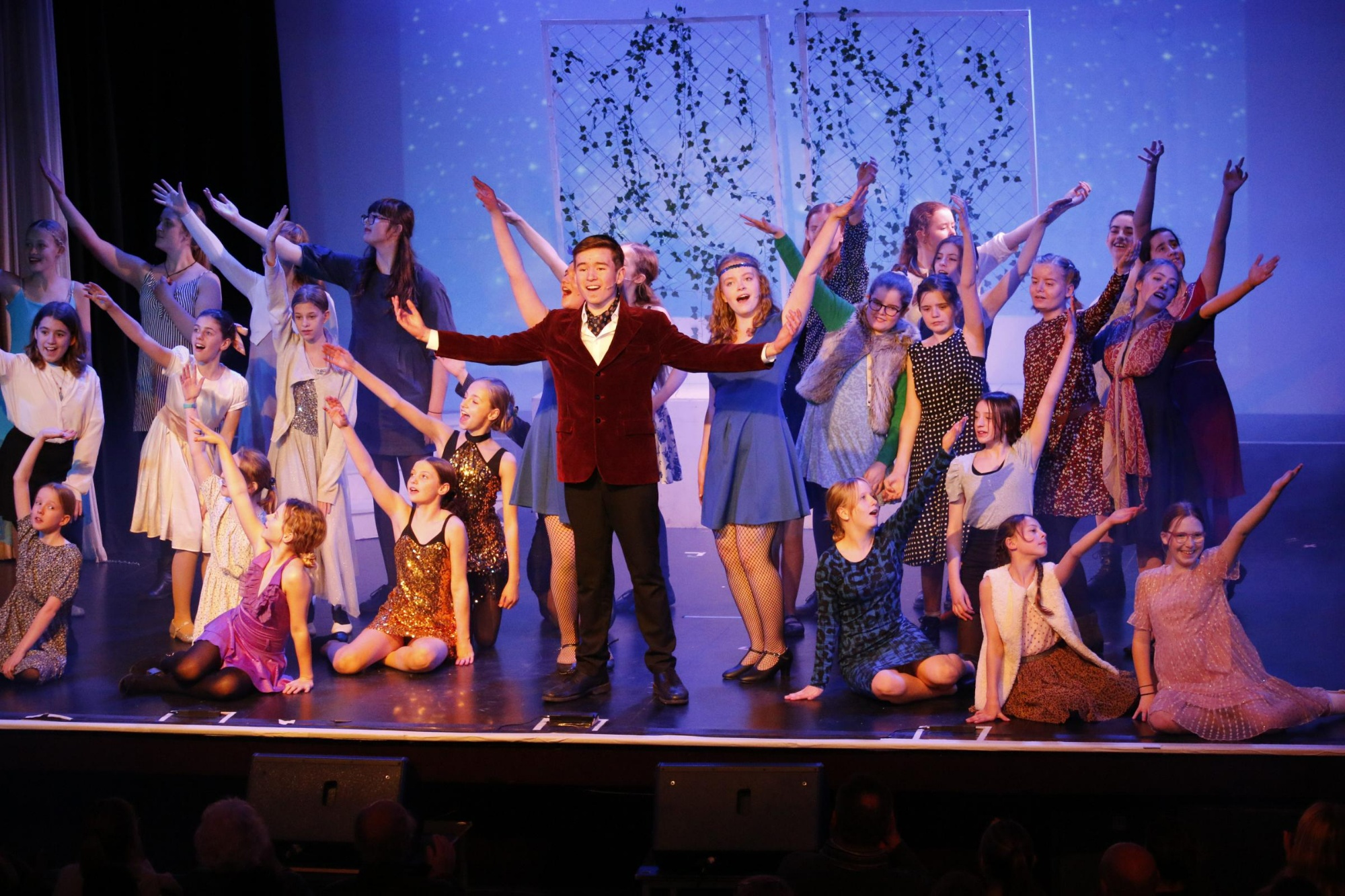
Balcarras Drama Department Curriculum Intent
Drama at Balcarras is a subject that is fun and creative whilst providing academic rigour and challenge.
Our department aim is to ensure that every child is given the opportunity to develop their confidence, creativity and collaboration skills, providing them with essential tools for life. Our core value of mutual respect underpins our entire curriculum; it is essential to our success as a department that students feel their opinions are valued and are confident in sharing their views.
Above all else, the Drama Department prides itself on being a wholly inclusive subject that aims to help pupils of all abilities to make the most of their potential. We believe that everyone can gain from access to the performance arts, enriching appreciation of both the form and content of dramatic works but also building empathy, understanding, teamwork and negotiation skills. We have constructed a broad, wide-ranging curriculum that introduces students to a range of theatrical forms and genres. Students are assessed in three areas: creating; performing and responding. We value the importance of oracy in developing students’ communication skills and confidence and encourage students to see the value in the collaborative work that they engage with in their drama lessons. Through discussion and evaluation of performance we aim to create eloquent, literate students who can use drama terminology confidently to express their ideas. We have high expectations of our students who understand that discipline is a crucial skill for any successful performer.
Through this diverse and interesting curriculum, we aim to ensure that students have opportunities to:
- Develop collaboration, teamwork and leadership skills
- Have the confidence to discuss and share creative ideas with their peers
- Develop the confidence to perform in front of their peers
- Watch, analyse and evaluate a range of live theatre
- Create characters through both physical and vocal skills
- Learn about a range of design aspects including set, sound, lighting and costume
- Explore a range of genres and theatre practitioners
- Devise their own performances based upon a range of stimuli
- Feel confident working with scripts, moving from page to stage
- Understand the importance of drama and performance in our society
- Develop empathy and respect for each other
Learning Journey
|
Year |
What students will learn |
|---|---|
|
7 |
Autumn Term -Students will understand the health and safety requirements of the Drama classroom. -Students will understand and be respectful our Drama department ethos. Students will understand the importance of communication and collaboration in Drama and will apply these skills to their group work. Students will learn about our core values of creativity, inclusivity, collaboration and discipline. -Students will know what the following dramatic devices are and will be able to use them in their work: freeze frame, slow motion, thought tracking, flashback. -Students will know what the terms ‘physical skills’ and ‘vocal skills’ mean. Students will be increasingly aware of these in their own performances and will create characters by adapting their physical and vocal skills. -Students will understand about plays having a structure including beginning, middle and end. Students will also know about different dramatic structures including flashback, flash forward and split scenes. Assessment: Performance of a modern Fairy Tale (creating and performing). Spring Term -Students will understand what the term mime means. They will learn the following key terms: mime, facial expression, fixed point, clocking the audience, comedy. Students will be able to apply these terms to their own performances. -Students will know who Shakespeare is and be able to make reference to some of his plays including: The Tempest; Romeo and Juliet and Hamlet. -Students will learn about the context of Shakespeare’s work and performance conditions. -Students will have the experience of performing extracts from Shakespeare. Summer Term -Students will understand the key conventions of scripts including key terms such as: Act, Scene, Stage Directions, Italics. -Through their study of Charlie and the Chocolate Factory, BFG and The Twists, students will learn about how to move from page to stage and bring a script alive. Students will learn how to physicalise their scripts and add movement. Students will learn how to create characters based upon the information in the performance text. -Students will know strategies for line learning and will be able to learn a few lines of script. Assessment: Scripted Performance (creating and performing). |
|
8 |
Autumn Term -Students will learn what the term ‘improvisation’ means. They will understand the core principles of improvisation including ‘saying yes’. -Students will develop their understanding of the Drama department ethos focusing on creativity, communication and confidence. -Students will be learn about and be able to use key terminology including: tone, pace, pitch, volume, facial expression, posture, body language, audience. -Students will be able to use the key terms above to evaluate the effectiveness of improvised performances. Assessment: Evaluation of improvised performances (responding).
Spring Term -Students will know what ‘Musical Theatre’ is as a genre and why it is an important part of the Theatre industry. -Students will learn how to perform songs from some key musicals including: Oliver, Annie and Bugsy Malone. Students will learn how to use techniques including: synchronisation, choral speech, canon. Students will be able to use the key term choreography and be able to choreograph their own routines. -Students will revise their work on script but apply this to a different genre. Students will continue to develop their characterisation skills when moving from page to stage, using scripted extracts from Matilda. Summer Term -Students will understand what ‘Melodrama’ is. They will understand where the genre comes from, the context of the genre and why it is an important part of Theatre. -Students will learn about the importance of music within Melodrama as a genre and will experiment with this in their own performances. -Students will understand what the following key terms mean and will be able to spot them when watching Melodrama: stock characters, archetypes, climax, exposition and moral. -Students will learn how to create their own Melodramas and apply their characterisation skills to these. Assessment: Students will perform their own Melodrama (creating and performing). |
|
9 |
Autumn Term Students will learn about the genre of comedy. Students will understand different types of comedy including: farce, slapstick, situational humour. Students will learn about the work of Mischief Theatre Company and watch some of their plays. Students will be able to evaluate how comedy is created here through techniques such as timing, over exaggeration, satire. Students will revise their previous work on script and will apply this to scripted extracts. Students will develop their characterisation skills when performing scripts from Mischief Theatre Company. Students will also revise and develop their work on mime when considering the work of Charlie Chaplin. Students will work on physical comedy, developing their skills and revising key words such as posture, gait, stage space. Spring Term Students will understand the term ‘devising’ and be able to use this. Students will also understand the term ‘stimuli’ and will be able to create their own work based upon a variety of stimuli focusing on the themes of protest and social issues. Students will understand what verbatim theatre is and will be able to use this in their own work. Students will know who the theatre practitioner Stanislavski is and will understand his core principles. Students will begin to understand some of his methodologies, particularly the ‘Magic If’. Assessment: Students will rehearse and perform a piece based upon a stimulus (creating and performing) Summer Term Students will learn about the genre of Theatre in Education and what this term means. Students will apply this knowledge to their study of Mark Wheeler’s Too Much Punch for Judy. Students will develop their characterisation skills and perform key extracts considering episodic structures, narration, breaking the fourth wall. Students will learn who Brecht is and will understand some of his key methodologies including breaking the fourth wall, direct address, placards and episodic structures. Students will understand Brecht’s reasons for doing this including his desire to promote social change. Students will learn how to create their own pieces and will learn how to write scripts for these. |
|
10 |
Autumn Term Students will learn about the methodologies of key practitioners including Brecht, Stanislavski, and Frantic Assembly. They will be able to apply their understanding of these practitioners to practical, devised work. Students will rehearse and perform a scripted performance of John Godber’s Teechers. Students will learn their lines for this and be assessed using the GCSE criteria. Students will evaluate their performance based upon this assessment feedback. Spring Term Students will learn how to devise a piece of Drama based upon a choice of three stimuli. Students will work collaboratively to devise and rehearse their performance. They will perform in front of the class and their performances will be filmed for moderation. Assessment: Devised Performance – 10% of GCSE Students will learn how to evaluate and respond to their devising process and performance. Students will demonstrate this learning through a written portfolio. Students will have one draft and respond to the feedback, improving their portfolio. Assessment: Written Portfolio – 30% of GCSE Summer Term: Students will learn about the play Inspector Calls. Students will understand the plot and context. Students will learn about set, sound, costume, lighting, staging. Students will also learn about how to perform as characters from Inspector Calls. Students will learn the accompanying key vocabulary and will be able to use this when discussing the play. Students will understand what the exam will look like and will practice questions. Assessment: Practice Exam Questions |
|
11 |
Autumn Term: Students will consolidate their learning and revise An Inspector Calls. Assessment: Mock Exam Students will learn how to perform two scripted extracts. This may be in a group, duologue or independently (monologue). Students will develop their understanding of how to apply their practical skills to creating a character. Students will listen to feedback and respond accordingly. Spring Term: Students will consolidate their practical work from the previous term. Assessment: Performance of two scripted extracts - 20% of GCSE. Students will see a piece of live theatre. Students will understand how to evaluate this piece of live theatre considering both performance and design. Students will be able to apply this understanding to exam questions. Students will revise An Inspector Calls and practice exam style questions. Students will receive feedback and respond accordingly. Assessment: Written exam – 40% of GCSE |
|
12 |
Autumn Term: Students will learn about key practitioners including revising and deepening knowledge of Stanislavski, Brecht and Frantic Assembly. Students will also learn about new practitioners including Artaud and Berkoff. Students will be able to apply this practical knowledge to their performances. Students will read and perform Dario Fo’s Accidental Death of an Anarchist. Students will understand the play’s plot, context, characters, themes and messages. Students will explore the world of Commedia d’ell Arte and will be able to apply this knowledge to their understanding of Accidental Death of an Anarchist. Students will also be able to apply their knowledge of Brecht to the text studied. Students will read Act One, Two and Three of The Tempest. Students will spend time ensuring that they are confident with the Shakespearean language and will be able to discuss the plot, characters and themes. Students will begin to consider the Original Performance Conditions. Spring Term: Students will be introduced to the exam questions for Accidental Death of an Anarchist. Students will understand key terms associated with both performance and design elements including set, lighting, sound and costume. Students will apply this understanding to their own ideas for both performing and designing Accidental Death of An Anarchist. Students will understand the requirements of Section B of Component Three of their written exam and will apply their understanding of Accidental Death when answering practice questions. Assessment: Section B Mock Exam– Feedback and A Level grade given. Students will read Act Four and Five of The Tempest. Students will spend time ensuring that they are confident with the Shakespearean language and will be able to discuss the plot, characters and themes. Students will develop their understanding of the Original Performance Conditions. Students will also create a design concept for their own production of The Tempest applying their understanding of a chosen practitioner. Assessment: Practice Essays for The Tempest – feedback given. After February half term, students will start on their Mock Devising – Component One. Students will work collaboratively in groups to produce a piece of devised work based upon a scripted extract. Students will apply the methodologies of a chosen practitioner to their performance. During this process students will work largely independently but will be provided with regular verbal feedback on their progress. Summer Term: Students will continue to develop their mock devised performances as in the Spring Term. Students will also be introduced to and understand the requirements of the portfolio questions. Assessment: Mock Devised Performance – Feedback and A Level band given. Students will then work on applying their practical skills to the development of a performance of a chosen monologue or duologue (2-3 minutes from a published play that is at least 1 hour in length). Assessment: Mock Scripted Performance – Feedback and A Level band given. |
|
13 |
Autumn Term: Students will begin the year with Component One – Devising. Students will spend this term creating their devised performance using a scripted extract as a stimulus. They will apply the methodologies of a chosen practitioner to this performance. Students will also complete a 3000-word written portfolio, responding to 6 key statements that analyse and evaluate their creative process and performance. Assessment: Component One Performance and Portfolio – 40% of A Level Grade – Teacher Assessment. Revision for written mock. Spring Term: Assessment: Mock Exam – Section B and C of Component Three. A Level grade and feedback given. After returning from mock exams, students will begin the process of Component 2 – Scripted. Students will be assigned groups and two scripts. Students will work on one group piece and then either a monologue or duologue. Students will be directed by their A Level teacher. Assessment: Component Two – Performance – 20% of A Level Grade – External Examiner. Students will go to see a piece of live theatre. Students will analyse and evaluate the success of this live theatre and create 500 words of notes that they can take in to the examination. Students will be able to apply their analysis and evaluation of the performance to exam style statements. The rest of the term is spent revising for Component Three -written exam. Assessment: Final Exam – Component Three – 40% of A Level Grade – Written Exam. |
KS3 Curriculum map
|
|
Autumn Term One |
Autumn Term Two |
Spring Term One |
Spring Term Two |
Summer Term One |
Summer Term Two |
|---|---|---|---|---|---|---|
|
Year 7 |
||||||
|
Year 8 |
||||||
|
Year 9 |
KS4 Curriculum map
|
|
Autumn Term One |
Autumn Term Two |
Spring Term One |
Spring Term Two |
Summer Term One |
Summer Term Two |
|---|---|---|---|---|---|---|
|
Year 10 |
||||||
|
Year 11 |
Revision |
|
|
KS5 Curriculum map
|
|
Autumn Term One |
Autumn Term Two |
Spring Term One |
Spring Term Two |
Summer Term One |
Summer Term Two |
|---|---|---|---|---|---|---|
|
Year 12 |
||||||
|
Year 13 |
|
|
Key Stage 3
Key Stage 3 Curriculum map
All students study drama at Key Stage Three; throughout KS3 we work on developing the core skills required to be a successful drama student. Students are not only taught about the practical fundamentals, but time is spent on ensuring that students understand the importance of collaboration, teamwork, and mutual respect. In Year 7, we begin by aiming to instil confidence in the young people that we teach through a range of exciting, creative lessons focused on successful collaboration skills – this underpins our whole drama curriculum.
Throughout Year 7, 8 and 9 we also ensure that students are exposed to a range of theatre conventions and styles including (but not exclusive to) melodrama, musical theatre, physical theatre, Shakespeare, and comedy. In Year 9 we being to prepare students for GCSE by introducing key practitioners such as Stanislavski and Brecht.
GCSE
GCSE Curriculum map
We are a popular subject at both GCSE and follow the Edexcel specification. Throughout GCSE study students are exposed to a range of theatre styles and have many opportunities to experiment creatively. We pick inspiring and challenging texts for the scripted unit which is often many students' favourite part of the course. We aim to include many enriching extra-curricular opportunities including trips to the theatre and visits from professional alumni.
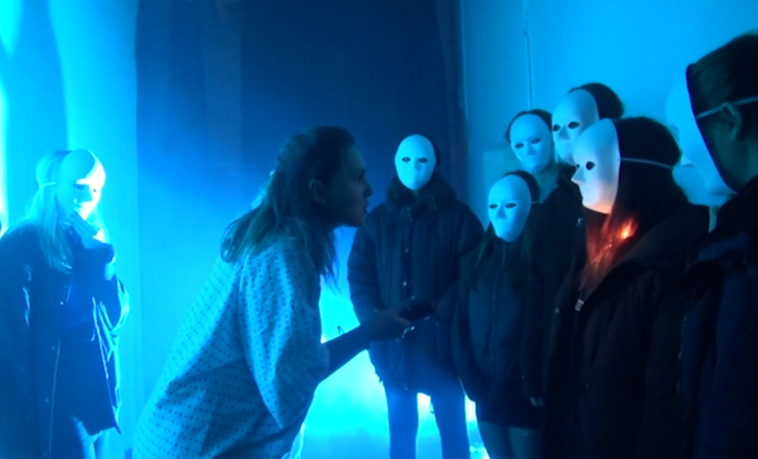
A Level
Students of A Level drama have great respect for the subject and understand it to be a rigorous, academic subject. We teach lessons that are imaginative, creative and appeal to individual personalities and styles in order to get the best out of the diverse range of students that opt for our subject. Many of our students go on to study Drama at University or further their practical studies at Drama School. We are proud to have a large number of students working professionally in the industry in a wide range of roles.
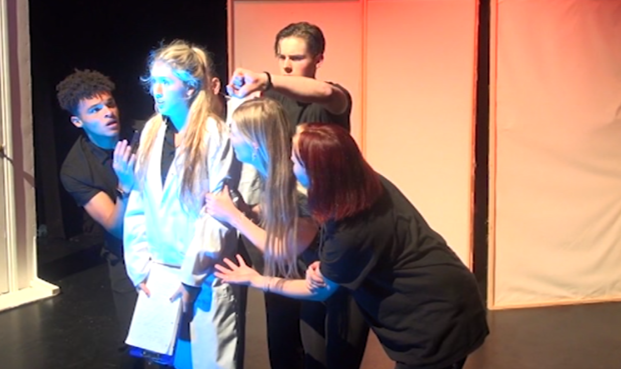
Extra curricular
A major part of the drama department’s year is our annual school play. This is an exciting part of not only the drama department’s work but of the whole school calendar. A huge number of students get involved each year (over 200 from all year groups!) and we are proud of the inclusive, inspiring shows that we produce. Be it on stage, backstage or front of house, pupils gain much from taking part, with many leavers describing their participation in shows as being a highlight of their experience at Balcarras
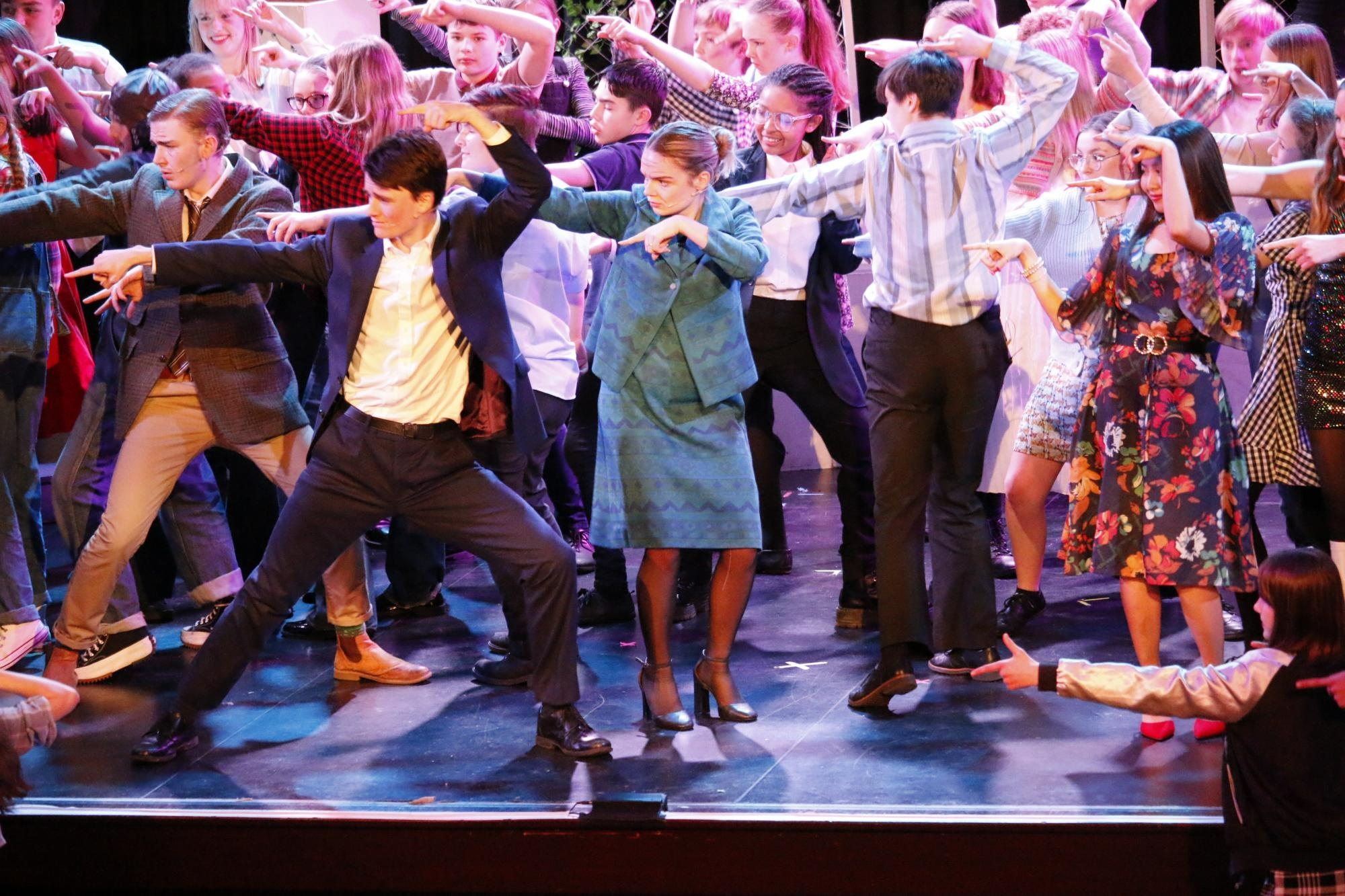
39 STEPS TO HEAVEN REVIEW
The 39 Steps
Balcarras School, Cheltenham
14th & 15th December 2023
According to an old English adage, if a thing is worth doing, it is worth doing well. In the case of the annual stage production at the Charlton Kings Arena, aka Balcarras School Hall, it is worth doing all over again. Ten years on from their 2013 presentation, the Alt-Na-Shellach (sorry, Alt-Na-Shelachhhh) gang was all here again, and the laughter factor soared higher than Ben Nevis during a production in which the fourth wall wasn’t so much as broken as totally demolished.
The plot is straightforward enough. London, August 1935. A beautiful young woman is found stabbed to death in Richard Hannay’s Portland Place flat, involving (or infolfing?) him in a dastardly scheme to plunge Britain into war and prompting his desperate race to the north to evade the long arm of the law, only to run headlong into it, or what passes for one – they’re all German spies, yer see - whilst seeking sanctuary in rural Scotland. It can only be The 39 Steps, and in the hands of Tony Bennett’s talented troupers, quite simply the best show in town.
From the start, this hugely entertaining production scarcely let up, careering along as wildly as the express train that carries Hannay through the suffocating mist to his date with destiny at the Forth Bridge. Tony Bennett’s hilarious adaptation of his 2013 adaptation of an eternity of previous adaptations of John Buchan’s classic novel was another rollercoaster of imagination, improvisation, glamour and comedy, which highlighted once more the vast reserves of talent at this renowned bastion of learning, and all robustly supported by the highly accomplished orchestra under Jane Ward Watts.
Splendidly costumed by wardrobe mistress Kate Daniels and her team, here was another Balcarras cast of thousands, well, 187 of them, featuring Siobhan Winterbottom’s tartan-draped and glitzy dancers, swooning newsreaders, batty local political activists and morose Scotsmen, replete with commendably convincing accents (och aye). Given how one role became so pivotal, did anyone consider the subtitle Operation Milkman?
Elsewhere on the moors, the major principal roles were shared between the élite of the school’s actors, including two Richard Hannays on each night, each sporting pencil moustaches as wide as the Trossachs (No, dear, Trossachs), pumping adrenaline and portraying the hero in his own distinctive and witty idiom, with both appearing in time for the grim climax at the London Palladium. On which subject, all rise for the two Mr. Memorys, articulate, histrionic and wonderfully engaging. There was even an amusing cameo from headteacher Dominic Burke as a vengeful, Red Baron-ish fighter pilot, ticking the box for Hitchcock’s 1959 film North by Northwest, and when did you last find yourself marking time to The Proclaimers’ I’m Gonna Be (500 Miles) at curtain down? This show had it all, and from an academy that will carry the flag for school music and drama for decades to come.
A team effort of gargantuan proportions, and an evening of pure happiness. I would happily walk 500 miles to see this show again.
Simon Lewis
Recent productions have included: Singing in the Rain and We Will Rock You! We also have a very busy repertory of examination presentations including the Year 11 GCSE scripted and devised plays and A Level Productions. To see what productions have been put on at school see here. The drama department also trains and runs the school TechTeam. Led by our resident full-time technician, they provide lighting, sound, stage management, projections and a range of other technical solutions for all school events (productions, variety shows, music concerts, assemblies, open evenings, et al). The students form a strong crew and really enjoy what they do - indeed, like our actors, many go on to a career in the industry. We also offer a lower school drama club on Monday lunchtimes.
Trips
Beyond school, we encourage students’ interest through a range of theatre visits for various year groups. These are popular and make a major contribution to pupils' understanding and enjoyment of the subject. We have been proud to host regular visits from touring theatre companies such as Ed Hall’s Propeller Theatre Company, Vamos Theatre, Scene Productions, Roughhouse Company and others. We also arrange regular tie-in events with Cheltenham Everyman and the RSC. We were a pioneering school for the RSC schools broadcast.

